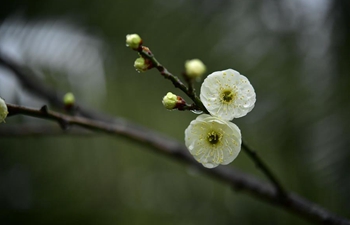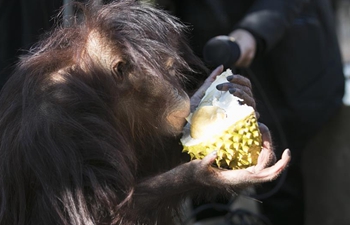SYDNEY, Jan. 27 (Xinhua) -- Record high temperatures have devastated bat colonies across South Australia's state capital Adelaide, with up to 3,000 flying foxes dropping dead from trees by the end of the weekend, according to local media.
At least 1,500 grey-headed flying foxes collapsed at the city's botanic gardens, parklands and riverbanks, with wildlife conservationists calling the incident the largest of its kind, the ABC news channel reported on Sunday.
"By the end of the weekend, we're probably looking at having lost between 2,000 and 3,000 bats," wildlife rescue service Fauna Rescue SA flying fox coordinator Sue Westover was quoted as saying.
"All of the deaths have been grey-headed flying foxes, which are actually classed as a vulnerable species now, so this is actually quite devastating," Westover said. The fruit bats are Australia's largest bat species and endemic to its south-eastern regions, with average wingspans stretching up to 1 meter and weights of up to 1 kg.
"They disperse the seeds, and also pollen which creates new tree growth, new forest growth. Basically without the flying foxes helping to spread everything, we won't have trees," Westover said.
"The highest number was around 600 bats, a few years ago in the heatwave," she said.
Extreme heat hit the southern state last week, with the mercury at a decade-high of 46.6 degrees centigrade in the capital alone, according to the channel.
Poultry farmers also reported massive losses, with one farm losing more than half of its flock of 2,000 birds alone despite cooler temperatures toward the weekend.
"It's a very catastrophic blow to our business. We have customers that rely on us through retail and food outlets so we'll just have to monitor our egg production now and see who we can supply to," Adelaide farmer Adam Oaten told the news channel.













